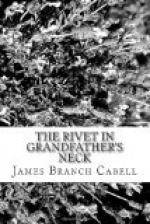“It would have been impossible, of course,” said Colonel Musgrave, “for me to have offered you any personal violence as long as you were, in a manner, a guest of mine. This field, however, is the property of Judge Willoughby, and here I feel at liberty to thrash you.”
Then he thrashed the man who had annoyed Patricia Stapylton.
That thrashing was, in its way, a masterpiece. There was a certain conscientiousness about it, a certain thoroughness of execution—a certain plodding and painstaking carefulness, in a word, such as is possible only to those who have spent years in guiding fat-witted tourists among the antiquities of the Lichfield Historical Association.
“You ought to exercise more,” Rudolph Musgrave admonished his victim, when he had ended. “You are entirely too flabby now, you know. That path yonder will take you to the hotel, where, I imagine, you are staying. There is a train leaving Lichfield at six-fifteen, and if I were you, I would be very careful not to miss that train. Good-evening. I am sorry to have been compelled to thrash you, but I must admit I have enjoyed it exceedingly.”
Then he went back into the garden.
V
In the shadow of a white lilac-bush, Colonel Musgrave paused with an awed face.
“Good Lord!” said he, aghast at the notion; “what would Agatha say if she knew I had been fighting like a drunken truck-driver! Or, rather, what would she refrain from saying! Only, she wouldn’t believe it of me. And, for the matter of that,” Rudolph Musgrave continued, after a moment’s reflection, “I wouldn’t have believed it of myself a week ago. I think I am changing, somehow. A week ago I would have fetched in the police and sworn out a warrant; and, if the weather had been as damp as it is, I would have waited to put on my rubbers before I would have done that much.”
VI
He found her still in the summer-house, expectant of him, it seemed, her lips parted, her eyes glowing. Rudolph Musgrave, looking down into twin vivid depths, for a breathing-space, found time to rejoice that he had refused to liken them to stars. Stars, forsooth!—and, pray, what paltry sun, what irresponsible comet, what pallid, clinkered satellite, might boast a purple splendor such as this? For all asterial scintillations, at best, had but a clap-trap glitter; whereas the glow of Patricia’s eyes was a matter worthy of really serious attention.
“What have you done with him, Olaf?” the girl breathed, quickly.
“I reasoned with him,” said Colonel Musgrave. “Oh, I found him quite amenable to logic. He is leaving Lichfield this evening, I think.”
Thereupon Miss Stapylton began to laugh. “Yes,” said she, “you must have remonstrated very feelingly. Your tie’s all crooked, Olaf dear, and your hair’s all rumpled, and there’s dust all over your coat. You would disgrace a rag-bag. Oh, I’m glad you reasoned—that way! It wasn’t dignified, but it was dear of you, Olaf. Pevensey’s a beast.”




